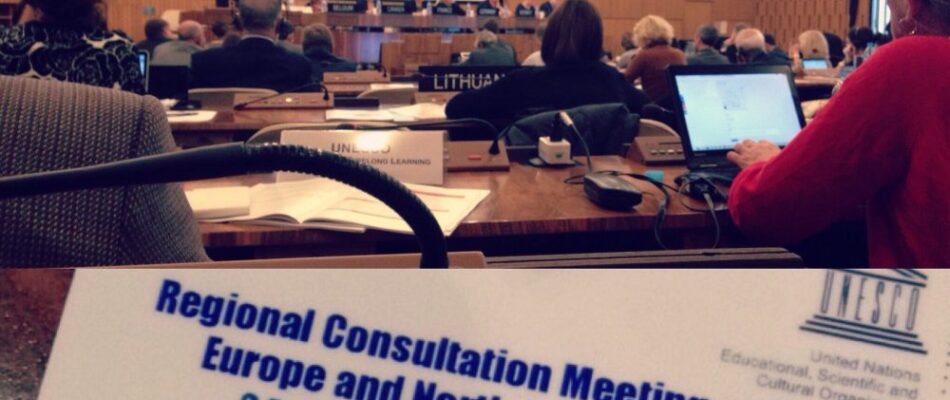
Education 2030 to focus on regional cooperation and student empowerment
Between 24-25 October 2016, our Executive Committee member, Beth Button, attended the UNESCO regional consultation meeting for the implementation of the sustainable development goal 4 (SDG4) and the education 2030 agenda at the UNESCO headquarters in Paris.
Attended by governmental representatives from Europe and North America, NGOs, and civil society representatives, the meeting was an opportunity, a year since the introduction of the goals, to assess and monitor governmental progress against the targets, and propose recommendations to strengthen regional cooperation. Discussions took place on the thematic areas that are priorities for the region, including the quality of education, skills and competencies, global citizenship education and education for refugees and migrants. These discussions then led to the development of a set of recommendations for ways in which member states can achieve the SDG4 and Education 2030 targets, and opportunities to coordinate and collaborate regionally.
Beth attended the round-table session on global citizenship education (GCED), where discussions were focused on how member states can adopt and embed GCED to ensure learners are equipped with the values, knowledge, attitudes and beliefs necessary to become active citizens and contribute to creating and maintaining peaceful and cohesive societies.
Within the discussion, particular attention was paid to the importance of preventing violent extremism through education- a topic recently explored during ESU’s 32nd European Student Convention (ESC32) in Bratislava, Thus, based on the suggestions made by ESU members during ESC32, Beth presented a number of proposals to develop pedagogical methods to better equip learners with 21st century skills and knowledge, which were successfully included in the final recommendations.
Students want an increased focus on student centered learning approaches and democratic school environments. Learners need to be supported as active partners in their education. This is essential to ensuring a diverse and inclusive curriculum, developing critical thinking and combating radicalisation through empowerment.
Beth was also the rapporteur for feeding back the outcomes of the discussion during the main plenary. There, she articulated the need for the document to make specific reference to the importance of education for sustainability – the omission of which had been a cause for concern among ESU and a number of other civil society groups. Sustainability was then re-added to the final document.
Background:
In 2016, in partnership with OBESSU and EI, ESU developed a joint vision for secondary and higher education in Europe, with specific policy recommendations for how to achieve targets in a number of priority areas. This document has underpinned all of ESU’s work and lobbying on the sustainable development goals, and is also being used by ESU’s member unions to engage with the goals on a national level.
ESU looks forward to continued involvement in the ongoing work striving to reach the targets for the SDG4, and in supporting its members to do the same.
Photo source: https://twitter.com/BethButton
